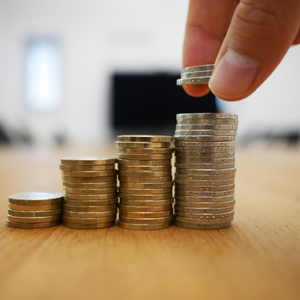Certificates of Deposit (CDs) are not to be confused with the compact discs we used to buy to listen to music, update computer software, or play games. Kids these days will not understand the psychological and emotional damage that came with finding a scratch or smug on the shiny side of those discs! No, what we are discussing here are the products banks offer to the public and in return for locking up your money with them, they will offer you interest on your money.
What Are CDs?
Remember when we spoke about bank accounts?
CDs are just another way for the bank to get you to keep your money with them so they can loan it out and make more money. Instead of an account that you can withdraw from, CDs are locked for a specific term (3 months, 9 months, 1 year, 3 years, 30 years, etc.).
The bank understands that parting with your money can be painful and they are prepared to pay you for holding your money with them. The interest rates offered on CDs closely follow what the prevailing national interest rate is at the time you put your money in. For better or for worse, the rate is locked in.

How Does This Grow My Passive Income?
You are probably wondering why this isn’t under the BUY category. Since there is a time limit to the interest you are receiving you really are just borrowing the income for the time being since there is an end date to the income. There are two ways a CD can grow your passive income.
The most obvious way is with the increase in income from the interest payments. If you have cash sitting in a savings account that you are not planning on touching, not even in an emergency, it may be worth shopping around to find a CD you could store your money in and get paid for it.
Another option is to accomplish a specific time-bound goal. Let say you’d like to invest a lump sum into an income producing asset. Money is tight, but you’ve been able to save up some money for an opportunity. Instead of keeping it in a checking/savings account where you may be tempted to use it for something else, putting it in a CD will not only earn you extra income, but also keep you from endangering your original plan.

Then, when the money is distributed back to you, not only will you have more money to work with than you had previously (despite a downturn or a recession in the economic landscape), not factoring in inflation, but you will be ready and able to pay for buying another product to increase your income!
Why Would I Want This Passive Income Stream?
Let’s take the year 2022 as an example. U.S. interest rates are on the rise as well as inflation. Meanwhile, traditional investments, stocks/bonds, are declining in value. Instead of trying to time the bottom of the market, it may make more sense to put your money in a CD that is insured by the FDIC and has very little chance to go down in value. Inflation, the rise in the price of goods relative to the domestic currency, also is eating away and the purchasing power of stagnant money.
Someone who is concerned about maintaining their original amount of money may consider investing in short-term CDs. As the CD comes due (i.e. when the bank will return your money), you can reassess the market to see if it is a good idea to reinvest in another CD at higher rates if one is available. This way you get the following benefits:
- your money is available to you within months
- you are locked in to take advantage of the prevailing interest rate
- you have a low chance of losing any money
While this does take some research and effort to purchase the CD, you can rest assured that your money is working for you as you wait to take advantage of future opportunities or goals (downpayment on a house, future expenses, etc.).
Risks & Considerations
Great care should be taken before tying up your money with the bank. You would want to ensure you have adequate means to pay for your expenses and an emergency fund in case something devastating happens while your capital is tied up.
You’d also want to ensure the bank or credit union you are looking into doesn’t have hidden fees, has been in business for a number of years, and has a digital platform for you to track your money and get your return of capital. You don’t want to get swindled by some fake bank promising high-yields potentially only to get one payment and then not be able to get any of your money back.
Locking in a rate of interest has risks as well! If rates are going down, you have to worry about reinvestment risk. For example, f you were getting 5% a year ago and at the end of the term rates are at 3%, then you may have to take on more risk in order to get a 5% return again.
In the reverse scenario, if rates are going up and you lock in a lower rate, you are stuck earning say 3% while over the term of the CD rates have increased to 5% and you’ve missed out on earning more interest. Maybe that last example is more of an opportunity cost than a risk, but regardless you need to align your investment to your goals and be aware of what you are potentially risking. There are a number of strategies for investing in fixed income products, be sure to reduce your risk by learning which one meets your needs!


